Vous pensez avoir un enfant zèbre à la maison ? C’est possible ! Je vous donne ici quelques conseils pour (1) identifier le HPI de votre enfant, (2) comprendre ce qu’il se passe dans sa tête, et (3) l’aider à avancer dans la construction de sa personnalité.
C’est quoi un enfant zèbre ?
Un enfant zèbre (ou enfant précoce, surdoué, etc.) est un enfant qui a un quotient intellectuel plus haut que la moyenne. Généralement, on estime qu’il faut un QI supérieur ou égal à 130 sur l’échelle de Wechsler pour faire partie des hauts potentiels. Contrairement aux idées reçues, ce cerveau sur-boosté n’entraîne pas une plus grande intelligence. En fait, il a un fonctionnement complètement différent des cerveaux « normaux » (atypiques dans le jargon).
Un enfant précoce ne va donc pas forcément tout réussir facilement, ou s’épanouir de la même façon que ses camarades. Au contraire, ce fonctionnement atypique cause régulièrement quelques troubles dans le développement de l’enfant surdoué. Il peut se révéler handicapant s’il n’est pas détecté à temps.
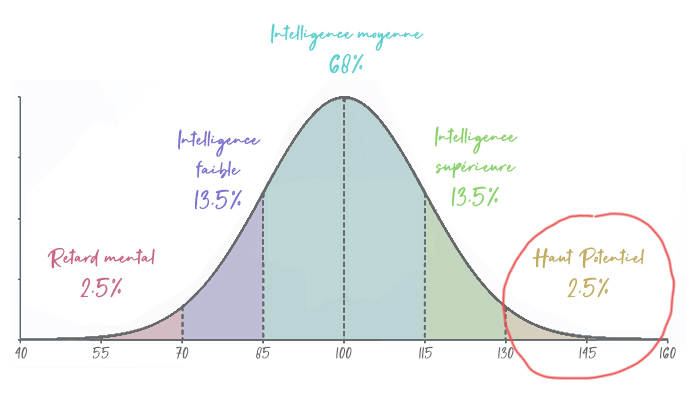
Caractéristiques de l’enfant précoce
Je tiens tout d’abord à préciser qu’il n’existe pas de moyen fiable à 100% pour une personne lambda d’identifier un enfant intellectuellement précoce. En effet, seul un véritable test de QI ainsi qu’une consultation chez un professionnel pourra donner une réponse fiable et réellement détecter un enfant précoce.
Néanmoins, certaines « caractéristiques » ou « symptômes » peuvent vous mettre la puce à l’oreille, dont je parle dans mon test pour enfants précoces. Notez cependant qu’ils diffèrent d’un individu à l’autre. Certains peuvent en présenter plusieurs et ne pas avoir de douance, alors que d’autres peuvent se fondre complètement dans la masse et être surdoués. J’ai également inclus certains petits ressentis vu « de l’intérieur » du haut potentiel, pour tenter d’aider à comprendre certaines réactions de votre enfant zèbre.
Hypersensibilité
L’hypersensibilité émotionnelle et sensorielle est une caractéristique prédominante chez les enfants zèbres. Néanmoins, il est très fréquent que, pour se protéger de cet afflux constant d’émotions et de stimulations, l’enfant se « coupe » du monde extérieur et semble un peu « dans sa tête » à longueur de journée. Ça a très rapidement été mon cas d’ailleurs. Je me suis toujours senti agressé et violenté par ce que je ressentais sans pour autant que ça ne se lise sur mon visage ou mes réactions. Je portais une sorte de masque. C’est fou comme tout prenait un sens démesuré. Un petit refus de rien du tout (« non Paul, tu attends encore 30 minutes pour que l’on passe tous à table même si tu as déjà faim ») pouvait me faire entrer dans une colère et une haine folle. Malgré tout, cette colère restait au fond de moi, et je me contentais d’attendre gentiment sur le côté.
Ma mère m’a toujours dit que mes émotions ne se lisaient que dans mes yeux. C’était semble-t-il le seul endroit où un œil avisé pouvait lire ma colère ou ma joie. Sinon, je restais droit et fade.
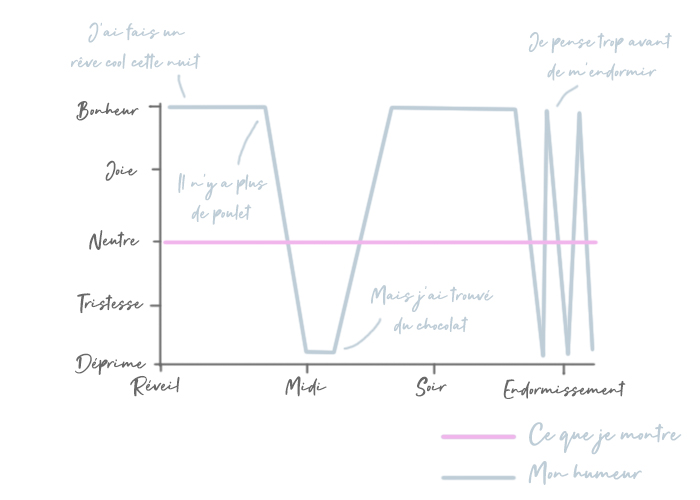
Décalage social
L’enfant zèbre va généralement comprendre le monde qui l’entoure très (trop ?) vite. En fait, il pense très vite et à plein de choses. Ces vagues d’idées et de liens complexes, cumulées avec une hypersensibilité du monde extérieur, lui permettent de développer ce que l’on appelle l’extra-lucidité. En gros, la naïveté de l’enfance s’en va très vite. L’enfant précoce grandit plus vite (du moins dans sa tête). Il ne s’intéresse pas aux mêmes choses que ses camarades. D’ailleurs, il trouve leurs activités futiles, voire débiles et ennuyantes.
En primaire, mes amis aimaient aller jouer dehors ou avec des figurines. Moi, j’aimais rester seul et créer des concours en ligne. Je faisais voter des inconnus pour élire le meilleur objet, le meilleur site, ou le meilleur n’importe quoi. Ils votaient en envoyant des SMS payants, et je me faisais ainsi un peu d’argent. J’avais pour projet d’économiser pour m’acheter une maison. Quand j’en parlais, mes copains ne comprenaient pas trop pourquoi je faisais tout ça. Et ceux qui le comprenaient n’arrivaient pas à se faire à l’idée que j’économisais cet argent pour un projet immobilier et non pas pour aller m’acheter des bonbons. Bref, on vivait dans deux mondes différents. L’école et l’université ne sont pas des milieux évidents pour le zèbre.
Malgré tout, ce décalage social peut se gommer par la création d’une sorte de personnalité de façade que l’on appelle faux-self. Le but pour le petit zèbre est de cacher bien au fond de lui-même sa personnalité sensible et fragile. Il se protège avec son faux-self qui correspond aux normes sociales et sociétales. L’enfant précoce a besoin d’être aimé, et il préfèrera se construire une fausse personnalité et s’oublier pour se sentir inclus que de se révéler et d’être rejeté.
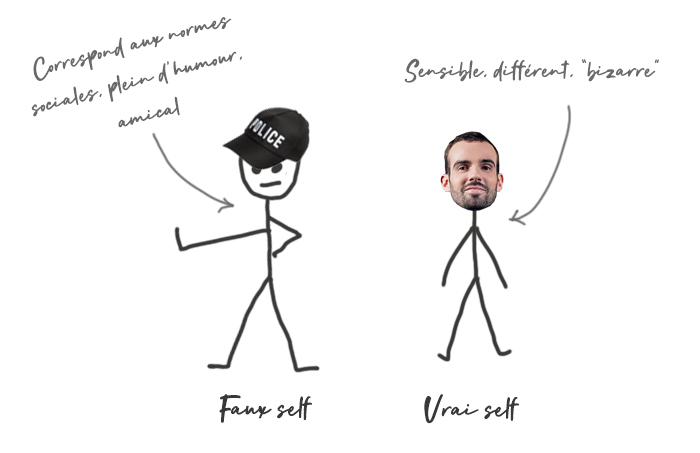
Créativité et curiosité
L’enfant précoce a besoin de comprendre et d’apprendre. Sa curiosité est sans limites. Lorsque j’étais enfant, j’adorais lire plein de bouquins variés, et aller à l’école pour apprendre. Dès la maternelle, on m’appelait « Paulo-la-science » parce que je connaissais beaucoup de choses sur des sujets divers.
En parallèle, cette curiosité et la sensibilité des hauts potentiels en font des personnes très créatives. D’ailleurs, d’un point de vue biologique et anatomique, les zèbres utilisent aussi bien leur cerveau droit que leur cerveau gauche. Cela s’appelle l’équipotentialité des hémisphères. Une personne lambda aura plutôt tendance à surutiliser l’hémisphère gauche (logique) par rapport au droit (créatif). La créativité ne prend pas forcément une forme artistique – même si, petit, j’adorais dessiner et la peinture ! Cependant, ce que je préférais le plus c’était de créer un monde entier dans ma tête. Comme ça, en une fraction de seconde. Et de créer et modeler absolument tout. C’était génial.
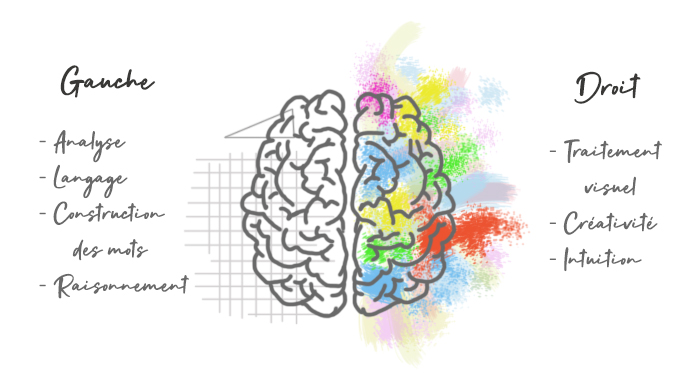
Aujourd’hui, je suis toujours très bien dans ma tête, mais la créativité se développe différemment. J’ai une passion pour les tableurs Excel gigantesques et automatisés, j’ai de nombreux projets professionnels qui avancent en parallèle, et je dessine (d’ailleurs, vous remarquerez tout au long de ce site mes début dans le dessins sur tablette… je m’éclate !). Et ma curiosité n’a pas diminué non plus. Ce qui est important, c’est de la nourrir.
L’enfant surdoué à l’école
En grandissant j’entendais souvent deux clichés sur les hauts potentiels à l’école. Le premier consistait à dire qu’un surdoué connaissait tout avant même que le professeur n’en parle. Le second était que l’enfant zèbre allait tôt ou tard se retrouver en échec scolaire. Sachez que ce n’est généralement pas le cas. J’en suis le parfait exemple. J’ai toujours été un très bon élève, sans pour autant tout savoir avant mes camarades. De plus, je me suis toujours très bien conformé au système scolaire. En fait, je pense que les personnes qui correspondent aux deux clichés précédents font généralement des tests de QI. On découvre donc rapidement qu’ils sont des enfants zèbres. Néanmoins, il y a plein d’autres jeunes pour qui tout va normalement et qui donc ne sont pas détectés.
De nombreux enfants zèbres sont dysgraphiques et peuvent avoir besoin d’un suivi de graphothérapie.
Comprendre les potentielles difficultés scolaires
Malgré tout, voici quelques pistes qui peuvent permettre de comprendre un peu mieux les causes des potentielles difficultés scolaires d’un enfant zèbre.
Des troubles de l’attention
Tout d’abord, nous avons le déficit d’inhibition latente. Pour faire simple, l’inhibition latente c’est la faculté qu’a le cerveau de ne sélectionner que les informations pertinentes. Si je marche dans la rue, mon cerveau ne va prêter attention qu’aux éventuels obstacles devant moi. Dans le cas d’une salle de classe, l’enfant ne va se concentrer que sur son (sa) professeur(e). Dans l’illustration ci-dessous, l’élève ne va se concentrer que sur les éléments colorés.
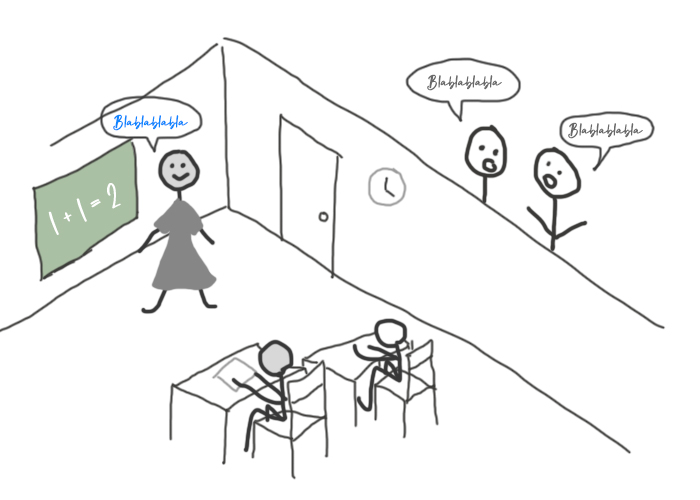
Un enfant précoce va avoir un déficit de cette inhibition latente. Autrement dit, son cerveau ne va pas hiérarchiser les informations qui arrivent jusqu’à lui. Cela s’apparente à des troubles de l’attention. En fait, le cerveau de l’enfant zèbre va se concentrer aussi bien sur le temps qu’il fait dehors, ses camarades ou les allers et venues dans le couloir derrière la porte que sur le cours à proprement parlé. Si on reprend l’image précédente, voici donc les éléments auxquels l’enfant intellectuellement précoce va prêter attention.
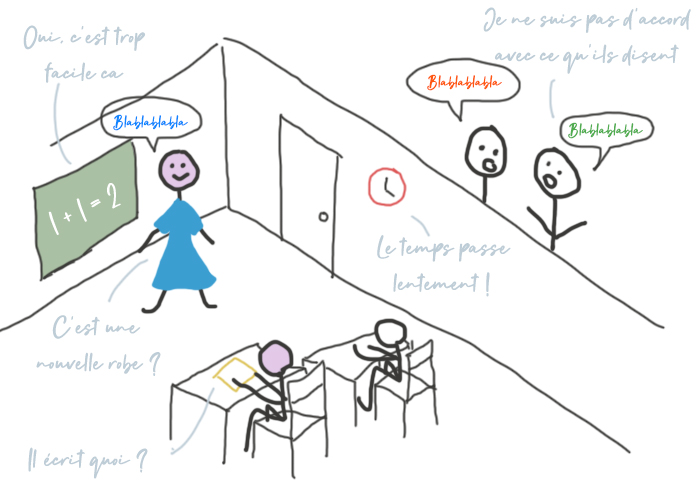
Une remise en question de l’autorité
L’enfant zèbre a un gros problème avec l’autorité, et ce que ce soit du côté des parents, du professeur, ou du futur manager. En fait, il s’est rendu compte rapidement que la figure d’autorité n’a pas la science infuse et peut donc parfois se tromper. À partir de ce moment-là, pourquoi l’écouter les fois suivantes, car le risque qu’il (elle) fasse une erreur est toujours là ? L’enfant précoce sait que ses parents apprennent à être parent sur le tas. Cela veut donc dire qu’ils vont faire des erreurs certaines fois. Dans ce cas, la seule « bonne » solution serait de faire ce qui lui semble juste à lui.
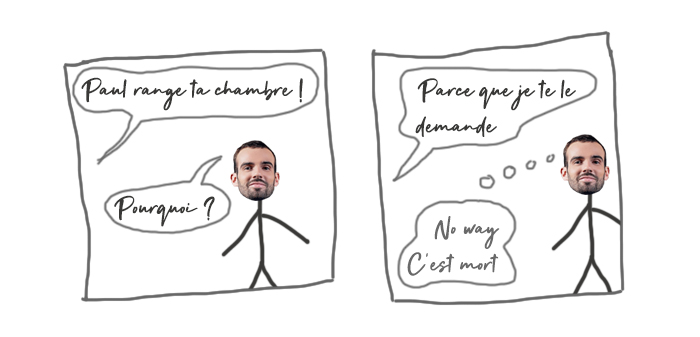
Un jour, ma professeur d’espagnol m’a rendu un devoir écrit. J’ai lu ses annotations avec attention, et ai trouvé une erreur dans son système de points. Elle m’avait oublié 0,5 points sur 20. Je suis rapidement allé la voir pour signaler cet oubli. À partir de ce jour, elle a perdu toute crédibilité à mes yeux et je me suis complètement braqué face à elle. Après tout, si elle n’est pas capable de compter les points, comment pouvait-elle m’apprendre quelque chose ?
Même rengaine avec mon professeur de philosophie en terminale. Je n’étais pas d’accord avec ce qu’il nous apprenait. Les points de vues de « grands philosophes » que l’on voyait en cours me semblaient délirants. J’ai fait une sorte de petite rébellion fasse à lui et ai refusé de lui rendre le moindre devoir durant tout le dernier trimestre. Résultat, j’ai eu un beau 0 de moyenne. Mes parents étaient désespérés, et moi plutôt fier de mon coup. Pourquoi rédiger des pages et des pages de dissertation sur une façon de penser que je jugeais mauvaise ?
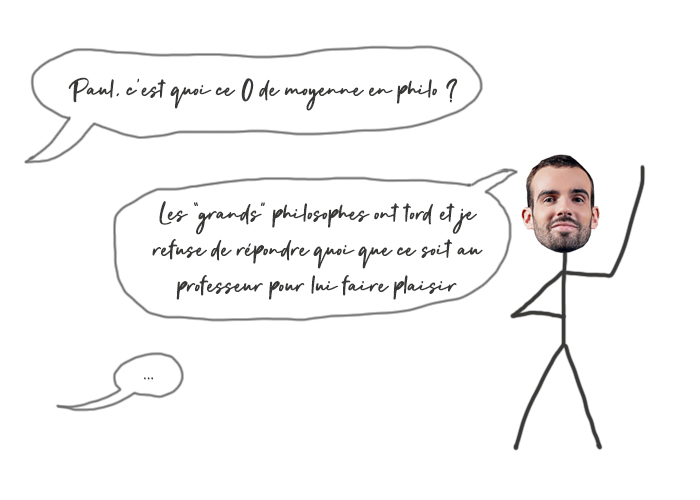
Les 6 profils d’enfants intellectuellement précoces
En 1988, deux américains ont défini 6 profils d’enfants intellectuellement précoces. Il s’agit de Georges Betts, un enseignant de l’Université du Colorado ainsi que Président de la National Association of Guifted Children, et Maureen Neihart, docteur en psychologie. Leurs résultats sont à prendre avec des pincettes car chaque individu est différent et je ne suis pas toujours convaincu par le principe de mettre les gens dans des cases. Néanmoins, vous reconnaitrez peut-être certains traits de votre enfant.
Type 1 – The Successful : l’élève qui réussit bien
Au moins 90% des élèves surdoués identifiés au cours de leur scolarité sont de type 1. Les enfants qui démontrent le comportement, les sentiments et les besoins classés dans la catégorie 1 ont appris le système. Ils ont écouté attentivement leurs parents et leurs professeurs. Après avoir découvert ce qui « marche » à la maison et à l’école, ils commencent à afficher un comportement approprié. Ils apprennent bien et sont capables d’obtenir des scores élevés aux tests de réussite et aux tests d’intelligence. En conséquence, ils sont généralement identifiés pour être placés dans des programmes pour les surdoués. Ils présentent rarement des problèmes de comportement parce qu’ils sont désireux d’obtenir l’approbation des enseignants, des parents et des autres adultes.
Ce sont les enfants dont beaucoup pensent qu’ils «réussiront seuls». Cependant, les type 1 s’ennuient souvent avec l’école et apprennent à utiliser le système pour se débrouiller avec le moins d’efforts possible. Plutôt que de poursuivre leurs propres intérêts et objectifs à l’école, ils ont tendance à suivre les mouvements de la scolarité, en cherchant une structure et une direction auprès des instructeurs. Ils dépendent des parents et des enseignants. Ils ne parviennent pas à acquérir les compétences et les attitudes nécessaires à l’autonomie, mais ils réussissent. Dans l’ensemble, ces enfants peuvent sembler avoir des concepts de soi positifs parce qu’ils ont été confirmés pour leurs réalisations. Ils sont appréciés par leurs pairs et font partie de groupes sociaux. Ils sont dépendants du système mais ne sont pas conscients qu’ils ont des lacunes en raison du renforcement qu’ils reçoivent d’adultes qui sont satisfaits d’eux et de leurs réalisations. Cependant, les enfants les plus brillants de la classe peuvent devenir des adultes compétents mais sans imagination qui ne développent pas pleinement leurs dons et leurs talents. Il semble que ces enfants aient perdu à la fois leur créativité et leur autonomie.
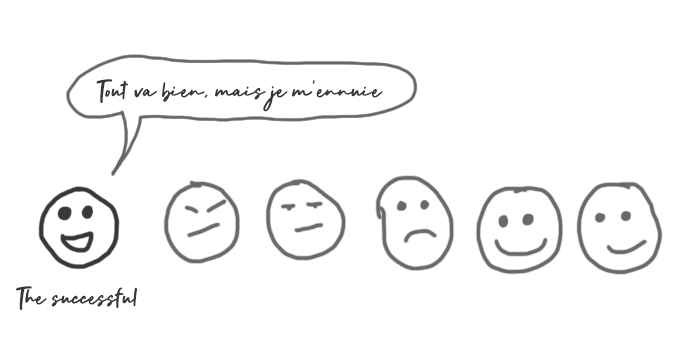
Type 2 – The Challenging : le provocateur
Les types 2 ont une pensée divergente et arborescente très développée. Le système scolaire ne parvient généralement pas à identifier les enfants zèbres de type 2. Ils possèdent un haut degré de créativité et peuvent sembler obstinés, sans tact ou sarcastiques. Ces élèves remettent souvent en question l’autorité et peuvent défier l’enseignant devant la classe. Ils ne se conforment pas au système et n’ont pas appris à l’utiliser à leur avantage. Ils reçoivent peu de reconnaissance et peu de récompenses ou d’honneurs. Leurs interactions à l’école et à la maison impliquent souvent des conflits.
Ces enfants surdoués se sentent frustrés parce que le système scolaire n’a pas affirmé leurs talents et leurs capacités. Ils sont aux prises avec leur estime de soi. Ils peuvent ou non se sentir inclus dans le groupe social. Certains défient également leurs pairs et ne sont donc souvent pas inclus ou bien accueillis dans les activités ou les projets de groupe. D’un autre côté, certains ont un sens de l’humour et de la créativité qui peuvent sauver leurs relations sociales. Néanmoins, leur spontanéité peut être perturbatrice en classe. Malgré leur créativité, ils ont souvent une image négative d’eux-mêmes.
Le type 2 a plus de « chance » de développer un comportement toxicomane ou délinquant si les interventions appropriées ne sont pas effectuées rapidement à l’école. Les parents de lycéens surdoués qui abandonnent l’école (type 4) notent fréquemment que leurs enfants ont présenté des comportements de type 2 à l’école primaire ou au collège. Bien que cette relation n’ait pas été validée empiriquement, elle comporte des implications importantes qui méritent d’être examinées sérieusement.
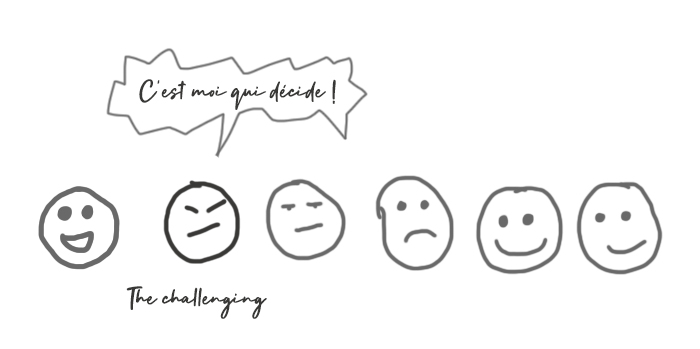
Type 3 – The Underground : l’élève effacé
L’enfant zèbre de type 3 est connu comme «le surdoué de l’underground». En général, ce comportement se développe plutôt au collège et chez les filles – bien que les garçons puissent également vouloir cacher leur talent. Si un garçon doué entre dans la clandestinité, cela a tendance à se produire plus tard, au lycée, et généralement en réponse à la pression sociale.
En général, les filles de type 3 sont des filles douées dont les besoins d’appartenance augmentent considérablement au collège. Elles commencent à nier leur talent afin de se sentir plus incluses dans un groupe de pairs non doués. Les étudiantes très motivées et très intéressées par les activités académiques ou créatives peuvent subir une transformation radicale apparemment soudaine, perdant tout intérêt pour leurs passions précédentes. Elles se sentent souvent anxieuses. Leurs besoins changeants sont souvent en conflit avec les attentes des enseignants et des parents. Trop souvent, les adultes y réagissent d’une manière qui ne fait qu’augmenter leur résistance et leur déni. Il y a une tendance à pousser ces enfants, à insister pour qu’ils continuent leur programme éducatif, peu importe ce qu’ils ressentent.
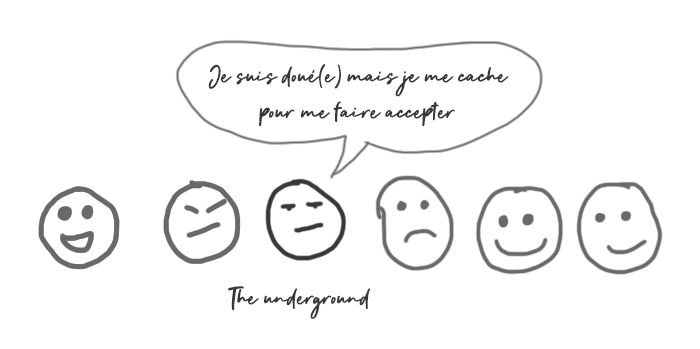
Type 4 – The Dropout : le décrocheur
Les enfants zèbres de type 4 sont en colère. Ils sont en colère contre les adultes et contre eux-mêmes parce que le système ne répond pas à leurs besoins depuis de nombreuses années et ils se sentent rejetés. Ils peuvent exprimer cette colère en étant déprimés, renfermés ou sur la défensive. Souvent, les types 4 ont des intérêts qui sortent du cadre des programmes scolaires ordinaires et ils ne reçoivent pas de soutien. L’école leur semble hors de propos voire hostile. Pour la plupart, ce sont des élèves du lycée, bien qu’il puisse parfois y avoir un élève plus jeune qui fréquente l’école sporadiquement ou seulement certains jours et qui a essentiellement «abandonné» émotionnellement et mentalement sinon physiquement.
Les élèves précoces de type 4 sont souvent des enfants surdoués qui ont été identifiés très tardivement, peut-être pas avant le lycée. Ils sont amers et pleins de ressentiment parce qu’ils se sentent rejetés et négligés. Leur estime de soi est très faible et ils ont besoin d’une relation de travail étroite avec un adulte en qui ils peuvent avoir confiance. Les élèves de type 4 ont souvent eu un comportement de type 2 lorsqu’ils étaient plus jeunes.
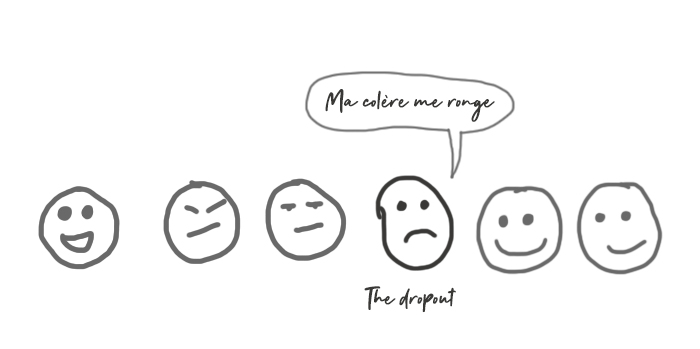
Type 5 – The Double-Labeled : le doublement exceptionnel
Le type 5 fait référence aux enfants surdoués qui sont physiquement ou émotionnellement handicapés d’une manière ou d’une autre ou qui ont des troubles d’apprentissage. La grande majorité des programmes surdoués n’identifient pas ces enfants et n’offrent pas non plus de programmes différenciés qui répondent et intègrent leurs besoins particuliers. Heureusement, la recherche sur l’identification efficace de ces enfants a été prometteuse, et il existe des suggestions pour proposer des alternatives de programmation. Ils ne présentent souvent pas les comportements que les écoles recherchent chez les surdoués. Les enfants zèbres de type 5 peuvent avoir une écriture bâclée ou des comportements perturbateurs qui les empêchent de terminer le travail, et ils semblent souvent confus à cause de leur incapacité à effectuer les tâches scolaires. Ils sont stressé et peuvent se sentir découragés, frustrés, rejetés, impuissants ou isolés.
Ces enfants peuvent nier avoir des difficultés en affirmant que les activités ou les devoirs sont «ennuyeux» ou «stupides». Ils peuvent utiliser leur humour pour rabaisser les autres afin de renforcer leur propre estime de soi. Ces enfants zèbres veulent de toute urgence éviter les échecs et sont mécontents de ne pas être à la hauteur de leurs propres attentes. Ils peuvent être très habiles à l’intellectualisation comme moyen de faire face à leurs sentiments d’insuffisance. Ils sont souvent impatients et critiques et réagissent obstinément aux critiques.
Traditionnellement, ces étudiants sont soit ignorés parce qu’ils sont perçus comme moyens, soit orientés vers une aide de rattrapage. Les systèmes scolaires ont tendance à se concentrer sur leurs faiblesses et à ne pas entretenir leurs forces ou leurs talents.
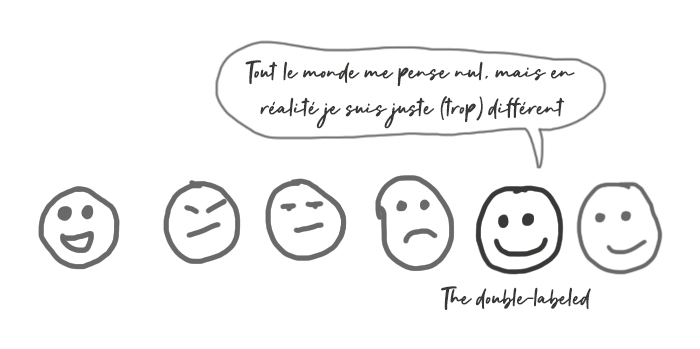
Type 6 – The Autonomous Learner : l’autonome
L’enfant précoce de type 6 est autonome. Peu d’enfants surdoués démontrent ce style à un très jeune âge, bien que les parents puissent en voir des preuves à la maison. Comme les types 1, ces élèves ont appris à travailler efficacement dans le système scolaire. Cependant, contrairement aux type 1 qui s’efforcent de faire le moins possible, les type 6 ont appris à utiliser le système pour se créer de nouvelles opportunités. Ils ne fonctionnent pas pour le système : ils font fonctionner le système pour eux. Les types 6 ont des concepts de soi forts et positifs parce que leurs besoins sont satisfaits. Ils réussissent et ils reçoivent une attention et un soutien positifs pour leurs réalisations ainsi que pour qui ils sont. Ils sont très respectés par les adultes et leurs pairs et exercent souvent des fonctions de leadership au sein de leur école ou de leur communauté.
Les élèves de type 6 sont indépendants et autonomes. Ils se sentent en sécurité dans la conception de leurs propres objectifs éducatifs et personnels. Ils acceptent et sont capables de prendre des risques. Un aspect important du type 6 est son fort sentiment de pouvoir personnel. Il se rend compte qu’ils peut créer des changements dans leur propre vie et n’attend pas que les autres facilitent le changement pour eux. Il est capable d’exprimer ses sentiments, ses objectifs et ses besoins librement et de manière appropriée.
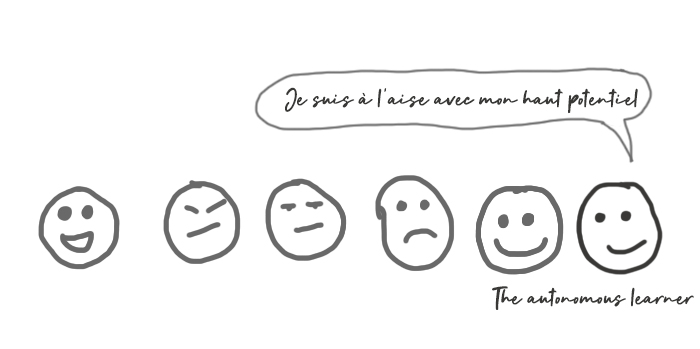
Conseils pour soulager un enfant zèbre HPI
Malgré ce tableau qui peut sembler un peu négatif, sachez avant tout que haut potentiel ne rime pas forcément avec problèmes. De mon côté, tout s’est toujours très bien passé. Je n’ai pas eu de difficultés scolaires ou de problèmes majeurs avec mon entourage (hormis quelques frictions avec mes parents lors de ma crise d’adolescence, mais ça c’est presque normal !).
Dans tous les cas, voici quelques conseils qui devraient vous permettre de soulager un peu votre enfant. Cependant, n’oubliez pas qu’il n’y a rien de mieux que d’en avoir le cœur net (via un test de QI par exemple) qui permettrait ensuite à votre enfant zèbre de comprendre plus précisément ce qu’il se passe dans sa tête. Expliquer à un enfant précoce qu’il est précoce et les impacts que cela peut avoir sur sa vie est très important.
Pour approfondir cette idée, j’ai rédigé quelques conseils à destination des parents d’un EIP.
Soyez justes
L’enfant atypique aime la justice. Je dirais même plus : il a besoin de justice. Et ce, à tous les niveaux. Par exemple, il est primordial pour moi que mes frères et sœurs (nous sommes 4 enfants, et je suis l’aîné) ne bénéficient pas de « traitement de faveurs » par rapport à moi. Si je vois que l’un(e) d’eux reçoit par exemple plus d’argent de poche que moi à son âge, vous pouvez être sûr qu’une crise va arriver très vite. L’opposé est vrai : lorsque ma petite sœur n’a pas eu le droit d’aller faire la fête avec ses copines à un âge où moi je pouvais, je suis allé le signaler à mes parents. Bon, elle avait en fait eu des mauvaises notes à l’école ce qui pouvait justifier une punition. Néanmoins, j’avais besoin de faire remonter ce que je trouvais être une injustice.
Jeanne Siaud-Facchin, psychologue spécialisée dans les hauts potentiels intellectuels (c’est d’ailleurs elle qui nous a appelés des zèbres pour la première fois !), propose une règle à mettre en place : la règle des 3 C.
- Clarté : expliquez les consignes ainsi que pourquoi elles sont importantes. Sachez que la justification « parce que je suis ton père et je te le demande» ne fonctionne pas. Il nous faut une vraie raison ;
- Cohérence : on ne fait aucune exception à la règle sans l’expliquer. Là, on revient sur l’histoire de ma sœur privée de sortie : j’ai eu besoin de comprendre la cohérence avec leur règle habituelle et de savoir pourquoi elle avait changé pour elle ;
- Consistance : on reste un parent fidèle à ses valeurs.
Nourrissez sa curiosité et sa créativité
Je l’ai évoqué tout à l’heure : l’enfant zèbre est (très) curieux et (très) créatif. Donnez-lui donc l’occasion de s’épanouir. Il y aura certainement une thématique qui va l’intéresser plus qu’une autre. Moi, c’était les maisons, l’architecture et les sciences – allez comprendre. Pour votre enfant, ce sera peut-être l’espace, les mathématiques, l’art, l’histoire ou je ne sais quoi d’autre. Identifiez de quoi il s’agit, et inondez-le(la) d’informations pour satisfaire sa curiosité. Dans la mesure du possible, faites des sauts dans des musées, des expositions, prenez des abonnements dans des magazines spécialisés, etc. Par exemple, mes parents m’avaient pris un abonnement mensuel à Sciences et Vie Junior. Je le lisais en une soirée, et il me donnait plein de nouvelles idées de recherches à approfondir pour le mois. Ou alors, on allait dans des musées mais uniquement ceux qui ont une architecture intéressante.
De plus, vous pouvez stimuler sa créativité. Moi, c’était avec le dessin et la peinture. Chacun son truc. L’important, c’est que vous lui donniez l’occasion de le faire. Et surtout, que vous le(la) souteniez dans sa démarche.
Les écoles pour surdoués
Pour terminer, sachez qu’il existe des écoles pour surdoués un peu partout en France. Si le système scolaire traditionnel ne convient vraiment pas à votre enfant, c’est donc une option possible. Malgré tout, elles peuvent représenter un coût financier supplémentaire qu’il faut bien avoir en tête. C’est pourquoi, si l’enfant zèbre se débrouille bien dans le cursus classique, je préconise de l’y laisser.
Vous pouvez aussi vous renseigner auprès d’associations pour enfants précoces.
Je suis en train de développer plus en profondeur cette partie (j’ai fait un cursus classique, donc je ne veux pas dire de bêtises !). N’hésitez pas à vous abonner à la newsletter pour être tenus au courant de mes avancées.
Conclusion
Pour conclure, un enfant zèbre est un jeune dont le cerveau fonctionne différemment du fait d’un QI supérieur à la moyenne. Ce fonctionnement différent peut parfois entrainer quelques difficultés à s’intégrer dans la vie « normale ». En effet, l’enfant précoce à tendance à se laisser guider par son hypersensibilité, son besoin de justice et sa pensée divergente. Des troubles scolaires ou au sein du cocon familial peuvent suivre. Cependant, gardez bien en tête que ces problématiques ne sont en aucun cas obligatoires. Beaucoup de hauts potentiels passent inaperçus car ils ne sont pas détectés vu qu’ils ne présentent aucun signe visible. On pourrait simplement les confondre avec des enfants sensibles, réservés, ou différents.
C’est pourquoi, en cas de doute, je vous invite à consulter un professionnel rapidement. Il permettra dans un premier temps de confirmer ou non votre théorie, et de vous aider à mieux accompagner l’enfant. Cet accompagnement peut se faire via l’installation de règles clairement définies à la maison, la mise en place de moments créatifs et/ou de découvertes, et l’explication précise de ce qu’engendre un haut potentiel.
